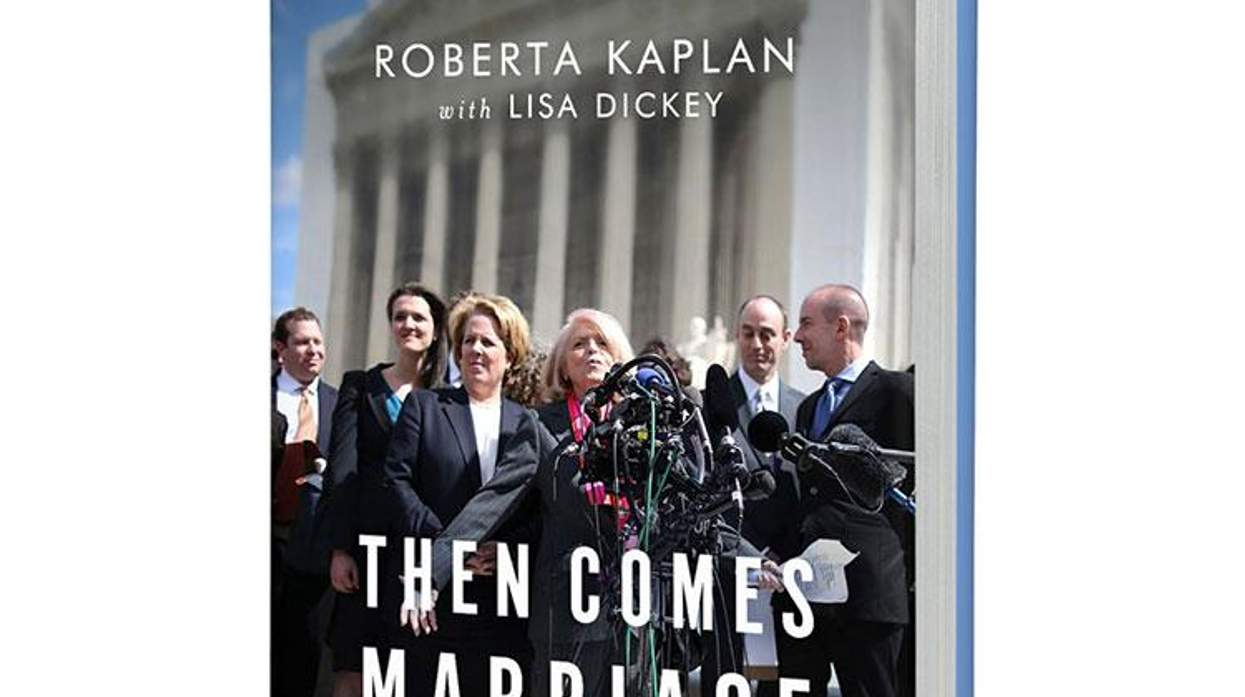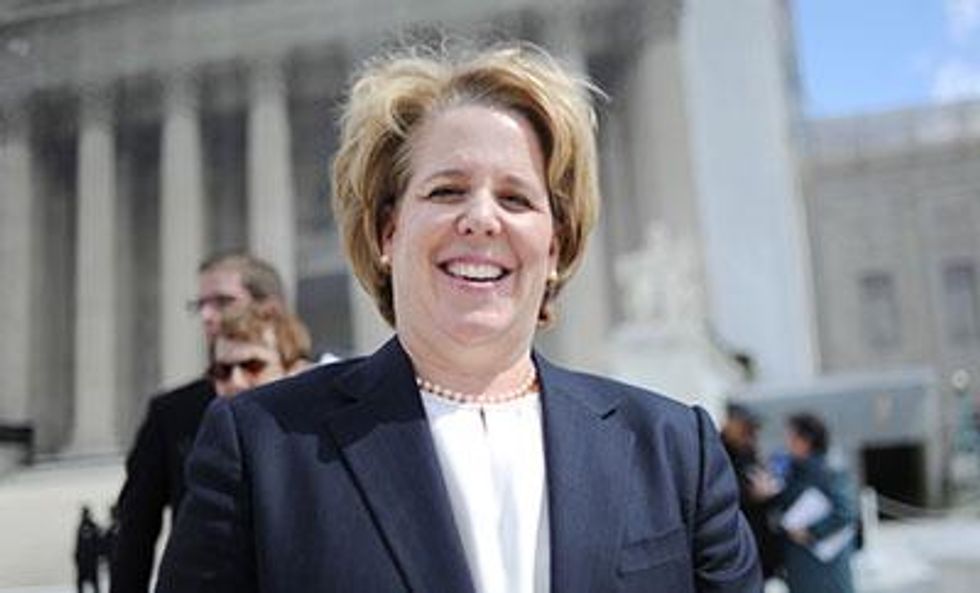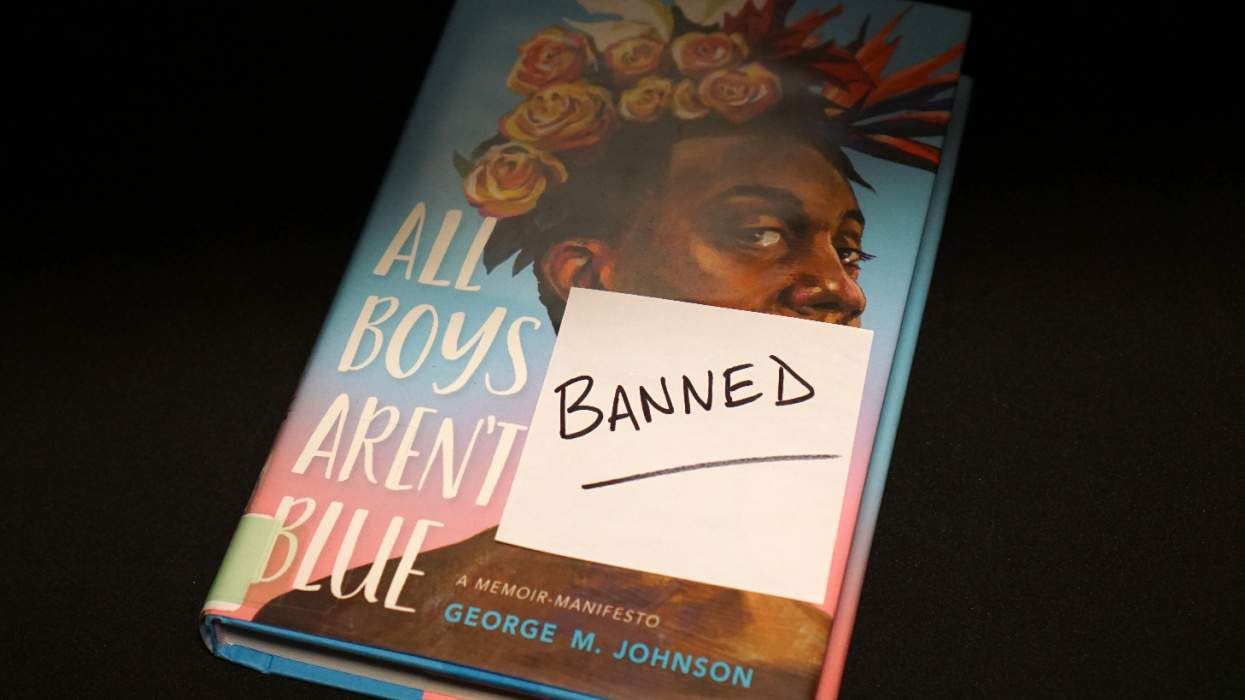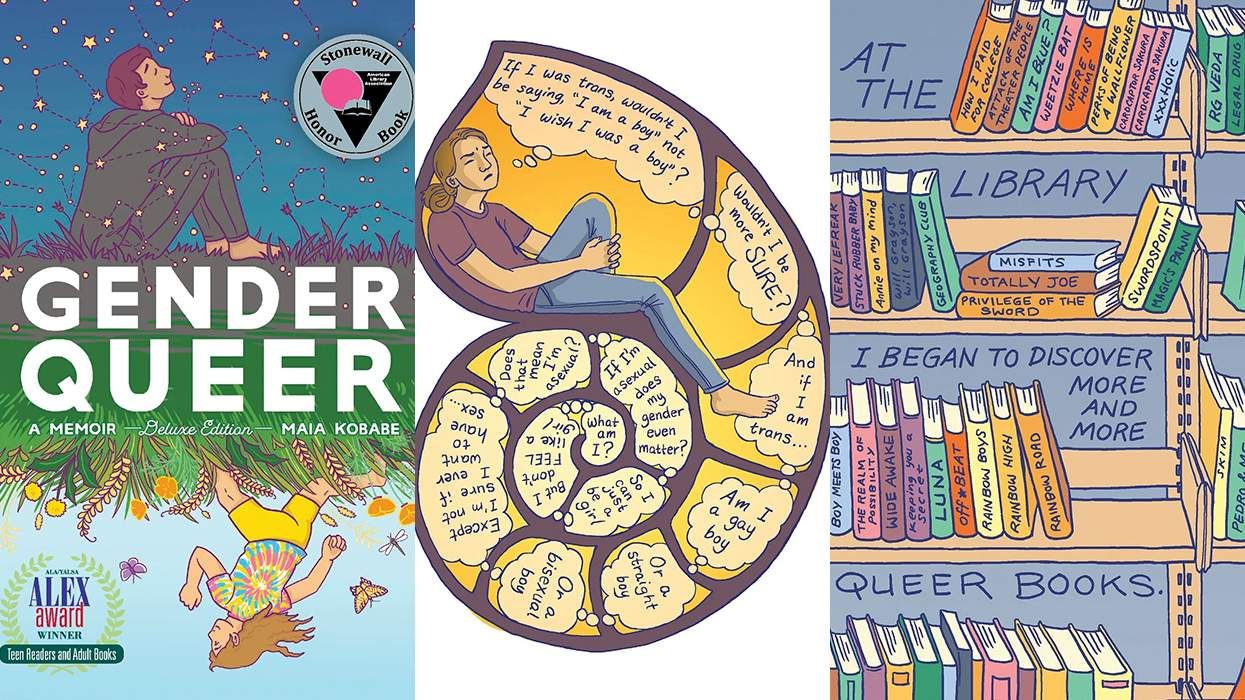"Thank you all, each and every one of you, for being here today," Edie said to the twenty or so people assembled in a small, somewhat ramshackle auditorium at the LGBT Center in New York. "This case is extremely important to me, and I am grateful for your presence and support." She was, as always, perfectly put together--dressed in a tailored black suit, purple silk blouse, and the circular diamond engagement pin that Thea had given her in 1967. From the moment she began speaking, she won the room over with her charm and dignity.
This was Edie's first public appearance as plaintiff in the just-filed lawsuit, Edith Schlain Windsor v. the United States of America--the official case title that had thrown her into a bit of a panic the first time that she saw it. Edie Windsor versus the entire United States? Who did she think she was? As Edie would later explain in the context of describing how coming out is a continuous process, it was one thing to be an out lesbian, but quite another thing altogether to be "the out lesbian who just happens to be suing the United States of America." But, as she would tell a reporter, "I thought, if Robbie's not terrified, I'm not terrified either."
I was far from terrified. In fact, I was thrilled. After long, tedious months of laying the legal groundwork and worrying constantly about Edie's health, I was relieved that we had finally been able to file her case. During the year and a half since Thea's death, the fight for marriage equality had picked up speed: Vermont, Iowa, New Hampshire, and Washington, DC, had all legalized equal marriage, and in August 2010, a lower court in California had ruled in the Boies and Olson lawsuit that Prop 8 was unconstitutional. That same summer, the 78-year-old federal judge Joseph Tauro ruled in the case Mary Bonauto had brought in Massachusetts, Gill v. Office of Personnel Management, that DOMA was unconstitutional, which meant Gill was already at the critical circuit court stage. I was impatient to get our case moving--with Edie front and center.
Putting the spotlight so squarely on one plaintiff was an unusual move in this context. In addition to having multiple plaintiffs, most gay rights cases naturally tended to focus on the organizations that brought them--GLAD, the ACLU, Lambda--since they can cogently articulate the relevant policy issues for each particular case. The Prop 8 case, on the other hand, focused on its star legal team of David Boies and Ted Olson. But highlighting our legal team was not going to make this issue matter or win our case. I knew the focus should be on Edie; she would be the spokesperson for our case, and before long, she would become the spokesperson for our cause. Right now, though, she was just an elderly widow whom we wanted to introduce to the world.
The first press conference "was such a small-time affair compared to most everything that happened after that because people didn't know about the case," remembers James Esseks. "They did not understand her story, didn't understand all that much what we were trying to do. It started out in a very rinky-dink context, a small press conference in the LGBT Center, sort of a little gym/auditorium kind of space with Edie, Robbie, and me up front."
James and Edie spoke, laying out Edie's story and the legal basis for our case, and then I took a turn at the podium.
There is no question that I get the best part of this press conference. Why?--you might ask. Because I get to speak this morning about the plaintiff, Edith or "Edie" Schlain Windsor. It is not very often that a lawyer gets a chance to represent their hero. In fact, it's probably a once-in-a-lifetime opportunity.
I had been searching for a good metaphor to describe how I felt about Edie, and, oddly enough for a case about lesbians, I ended up with a sports analogy. "I kind of feel like the kid who has spent years collecting baseball cards who finally gets to meet his or her favorite, all-star home run hitter. That's exactly what it feels like to have the honor and privilege of representing Edie Windsor." I then launched into what was to be a central theme for the rest of the case:
We are lucky enough to live in a world that has changed for the better in many ways. So many who did not have rights, including women and gay men and lesbians, now do and many gay people can and do now live their lives openly and with dignity . . .
[I]t is worth remembering that when Edie moved to New York to get her master's degree in mathematics from NYU in the 1960s, no one and I mean no one could be openly gay and pursue a career in any but a few very narrow professions.
That's why when Thea proposed to Edie she did so with a circular diamond pin rather than a ring so that Edie could wear it at her job at IBM and not be "out" at work and risk what might happen if people knew she was a lesbian.
Thea did that in 1967, you heard me correctly--in 1967--two years before the Stonewall rebellion that led to the modern gay rights movement. Take a moment and think about that. In 1967, the idea that two women would be able to get legally married to each other anywhere in the world much less in the United States was beyond comprehension. That Thea and Edie had the inner conviction, self-worth, foresight and bravery to get engaged at that time is one of the many reasons why Edie is such a hero.
We were finally off and running, although when we found out which district court judge we'd been assigned, I feared it might be more like off and strolling. Judge Barbara Jones was a solid, fair, and moderate judge who I thought would rule our way on the merits of the case, but unfortunately she was known for taking her time in civil cases. I had argued several other cases in front of her, so I knew she was far less tough on the parties about timing in civil cases than other judges in the Southern District. Considering the state of Edie's health, I had hoped for a more aggressive judge--someone who would order the parties to proceed quickly on a "rocket docket"--but when that did not happen, I decided we had better try to give Judge Jones every reason to speed it up.
So on November 22, 2010, less than two weeks after we filed our complaint, I wrote Judge Jones a letter explaining Edie's ongoing health issues.
Given the fact that the fraction of blood pumped by the ventricles of Edie's heart (or her ejection fraction) is very low (40%), her ongoing coronary disease, as well as the fact that she has a rapid heartbeat (or ventricular tachycardia), the decision was made to surgically implant an AICD (or an automatic insertable cardioverter defibrillator) in her chest to prevent sudden cardiac arrest . . .
Edie also carries nitroglycerine tablets with her at all times in order to deal with periodic attacks of angina. Given the circumstances, Edie understandably seeks to pursue this action as expeditiously as possible.
I doubted that this tactic would work, but it was worth a try. We weren't exaggerating any of these medical points--not only had Edie had a serious heart attack after Thea's death, but she had specifically asked me to make sure that I, or someone else, always had her nitroglycerin tablets on hand whenever we were with her at a public appearance. That conversation had a huge impact on me. I was determined to make sure that the court would understand the seriousness of Edie's heart condition and the fragility of her health. I truly felt like any time we managed to shave off the process, however slight, might be the margin between Edie living to see her victory--or not.
Three days later was Thanksgiving. Rachel, Jacob, and I were in the Hamptons and I was pretty sure that Edie was as well. I e-mailed her early that morning to invite her over for a lunch of cauliflower soup that I had made from scratch. When she did not reply for a few hours I did not worry, figuring that she probably was not spending Thanksgiving day perched in front of her computer. But that afternoon, when she finally did write back, her response--"I had a little heart incident yesterday"--alarmed me. She had become scared being home alone while not feeling well, so a friend had arranged a car service to take her back to the city on Thursday morning.
She was feeling better but was emotional. "My heart is full and behaving," she wrote, "and I'm crying for Thea all day and singing my head off at the same time. So I'm incredibly thankful for everyone here and for you and Rachel and Jacob in my life and . . ." She signed off with that ellipsis, and I felt my eyes well up. We just had to win this case for Edie.
The following week, on December 3, we received the court's scheduling order laying out deadlines for filing. Though the order went through April 2011, we were scheduled to still be filing various legal briefs and motions by that point. There was no way around it--this process was going to take time. I forwarded the document to Edie, who wrote back, "I'm exhausted. How does one wait three months?"
So on December 8, I sent another letter to Judge Jones. I informed her that Edie was suffering from an allergic reaction that restricted which medications she could take, and she was spending most of her time confined to her apartment. Once again, I asked the judge to expedite the case in any way possible, adding that we wanted to "inform Your Honor of these developments to the extent that plaintiff's health has any bearing on the Court's consideration of the pending motions."
Over the next year and a half, I would write about a dozen of these letters to Judge Jones, practically begging her to speed up the process. The team jokingly started calling them my "Edie has the sniffles" letters, and though I knew there was a risk we might be annoying the judge, I kept sending them. Julie Fink was worried we were overdoing it. "At certain points, Robbie would call me and say, 'Let's send a letter,' and I would say, 'Are you sure? We just sent one,' " she remembers. While I knew that Judge Jones probably saw the letters as irritating at best and little more than a lawyerly tactic at worst, I also knew that they would serve to remind her that Edie Windsor was a person, not just a name on a lawsuit. I was also confident that Judge Jones, being a fair person, would not hold my letter-writing campaign against Edie, even if she was not pleased with me.
With her various physical ailments, Edie was not having a great winter. And as the holiday season approached, mine was about to get much worse, too.
On December 13, Rachel's father, David Lavine, passed away after a difficult battle with multiple myeloma. Rachel's family is very close-knit, and David's death hit everyone very hard. He was a well-known figure in Connecticut politics, an environmentalist who had written and passed landmark legislation protecting wetlands and other natural resources; he was also a charismatic, handsome, and funny man who adored his family and who was one of my biggest cheerleaders. His death was going to leave a deep chasm in all our lives, including that of our four-year-old son, Jacob.
After David died, Rachel and I found ourselves trying to explain to Jacob what it meant, telling him that it was as if Grandpa David had gone to sleep forever, but that he lived on through us and through all the good that he had done in the world. We were not sure how much Jacob would comprehend about the loss, but as a very sensitive and bright child he understood death and its ramifications. And while he grieved for his Grandpa David, he was emphatic that no one else would ever die--especially none of the three of us. His worry lingered, and one night in his bath he turned to Rachel and quietly asked, "Mommy, can God die?"
"No," Rachel answered, "God is eternal. God never dies. God is within all of us and is something more than all of us." In comforting Jacob, we reminded ourselves of what mattered most--love and our belief that we are all part of something much larger than our individual selves. As far as we know, each of us only has one turn at life, and like my father-in-law, I wanted to make mine matter.
Rachel's family followed the Jewish tradition of sitting shiva at her mother's home in Rhode Island, where we had all gone for his burial and funeral service. Afterward, at the end of December, we went out to the Hamptons. I was physically and mentally exhausted. After the stress of the past couple of months, I just wanted to relax with my wife and child, away from the pressures of work and life for a brief time. One evening, with friends over, I decided to build a fire. Distracted and tired as I carried a few logs into the living room, I slipped on a spot of melted snow on the wooden floor and went flying. I crashed hard, breaking my leg and tearing several ligaments. On top of everything else, I would be ringing in the New Year on crutches. In the course of six frustrating weeks, we had shifted from off and running to off and limping.
By late january, I was walking on my own again, if a bit stiffly and cautiously. I received a call from Jean Lin, the Department of Justice trial attorney assigned to Edie's case, whom I knew from the New York marriage case when she had worked at the New York Attorney General's Office. As the defendant in our case, the DOJ was required to file its brief on behalf of its client, the United States of America, within sixty days of our November 9 filing. The DOJ had requested, and already been granted, a thirty-day extension, pushing their filing to February. Now Jean was calling to ask me for yet another thirty-day extension, so that they could file their brief in March.
Seriously? I thought. I had been sweating over the timeline for days, writing letter after letter urging Judge Jones to get the case moving, and now the DOJ wanted to delay it even more?
"No way," I said. "Not happening."
Jean was surprised, as it was pretty unusual to turn down such a request from the government, particularly at the beginning of a case. But I didn't care. Edie was fragile. We did not have to agree, and I did not intend to.
About ten minutes later, I received another call from the DOJ--this time from someone a little higher up the totem pole. We really need this extension, this person said, with some urgency in his voice. It would be best if you could just agree to it.
"No extension," I said. "Not going to happen. I'm sorry, but Edie Windsor is over 80 and in poor health. It is not in our best interest to wait." I hung up, annoyed. The DOJ had already had thirty extra days. I assumed they were planning simply to file a motion to dismiss the case, so what possible reason could they have for not having it ready on time? This was absurd.
On January 21, I received one more call. This time, it was from Associate Attorney General Tony West, then the number three person at the Department of Justice.
"Robbie," Tony said, "I understand two people have called you, and you've refused to agree to an extension." I readily conceded that he was correct and explained why. "Edie's not getting any younger. We need to get this case moving."
Tony paused, then said, "I'm asking you for an extension because we are seriously considering what position the government should take in this case." He told me that he was having discussions about our case with President Obama and Attorney General Eric Holder, and that they needed more time to decide what to do.
I have to admit, I did not believe him. I thought the Obama administration, like any defendant, was simply playing for time, messing with my client and my case, and I was irritated. DOMA was a terrible law, and I suspected that the government attorneys were not thrilled about having to defend it. Still, the government almost always defends its own laws in cases like this, so I felt they just needed to figure out their strategy and get on with the process, rather than holding everything up.
Given my assumption that this was an unnecessary delaying tactic, I decided to make some demands of my own. "Okay, Tony," I said, "I'll give you the extension, but I want something in exchange. I want you to agree that we won't have any standing issues in the case." If Tony agreed, it would mean the government couldn't argue against us on any technical, non-DOMA-related defense, such as claiming that Edie had "not exhausted her administrative remedies" by taking all the necessary steps to get her tax refund from the IRS. I had been suspecting the DOJ might try a defense like this, since they had already done so in the other DOMA cases.
Tony seemed taken aback. "No way," he said. "I won't give you anything." This type of bargaining was not really how things were done in the world of constitutional litigation, but I did not come from that world. I was a corporate litigator, and this was very much how we did things in my world. I was more than happy to negotiate, but Tony shut that down fast.
"Robbie," he said, his voice even. "I'm telling you that the attorney general of the United States of America himself is asking you for this extension."
"Let me think about it," I said. "I'll call you back." I hung up the phone.
I told my law partner Marty Flumenbaum, who sits in the office next door to mine, about the conversation. When he heard what had transpired, he said, "Robbie, are you crazy? The attorney general is asking for an extension on behalf of the president. Give it to them." Clearly, Marty felt there was no room for debate. Reluctantly, I went back into my office and called Tony.
"Okay, Tony," I said. "We'll give you the extension." Tony thanked me, and the conversation could have, and probably should have, ended there. But I couldn't help myself. I needed to remind Tony whose side the angels were on. "Tony," I said with more than a hint of irony in my voice, "I just want you to know that as you and the president deliberate upon this, I'll be praying for both of you."
ROBERTA KAPLAN is a partner at Paul, Weiss, Rifkind, Wharton & Garrison LLP. Since winning United States v. Windsor, she litigated the case against the gay marriage ban in Mississippi and filed "The People's Brief" in the Supreme Court case of Obergefell v. Hodges. She lives in New York City with her wife and son. This is excerpted from Then Comes Marriage, published by W.W. Norton & Co., October 5, 2015.
















Charlie Kirk DID say stoning gay people was the 'perfect law' — and these other heinous quotes
These are some of his worst comments about LGBTQ+ people made by Charlie Kirk.